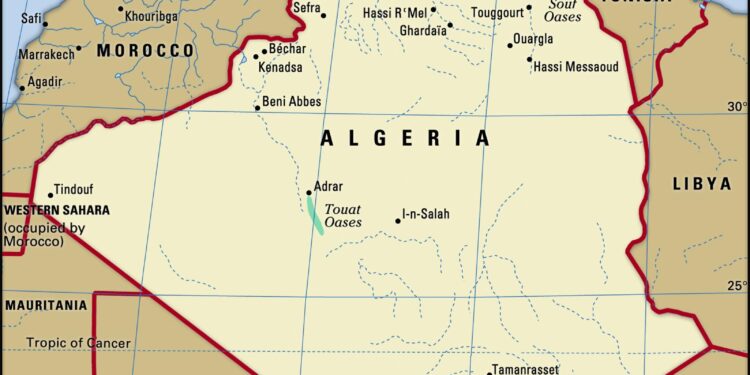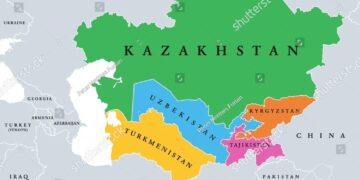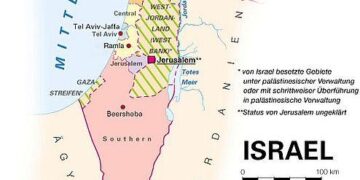Algeria and the United States Forge a New Military Partnership Amid Geopolitical Realignments
In a notable shift reflecting changing global alliances, Algeria and the United States have formalized a Memorandum of Understanding (MoU) to deepen their military collaboration. This agreement emerges as Algeria’s longstanding defense relationship with Russia shows signs of strain, prompting Algiers to diversify its strategic partnerships. Against the backdrop of an increasingly complex international environment—characterized by evolving security challenges and shifting power blocs—this pact signals Algeria’s intent to recalibrate its defense posture through closer ties with Washington.
The MoU outlines several key areas where both countries will intensify cooperation:
- Collaborative Military Drills: Expanding joint training exercises aimed at boosting operational readiness and interoperability between Algerian and U.S. forces.
- Counterterrorism Initiatives: Enhanced intelligence exchange and capacity-building efforts designed to tackle terrorism threats prevalent in North Africa and the Sahel region.
- Defense Technology Sharing: Partnerships focused on modernizing Algeria’s armed forces through access to advanced military equipment and technology transfer programs.
This emerging alliance not only reflects Algeria’s pragmatic approach toward securing its national interests but also highlights Washington’s strategic ambition to strengthen its foothold in North Africa. Analysts suggest that as Algerian-Russian ties wane, American influence is poised to grow, potentially reshaping regional defense dynamics over the coming years.
| Main Cooperation Areas | Anticipated Benefits |
|---|---|
| Joint Training Programs | Improved combat effectiveness |
| Terrorism Intelligence Sharing | Strengthened regional stability |
| Aquisition of Advanced Defense Systems | Evolved military capabilities aligned with modern warfare demands |
Regional Security Impacts Stemming from the Algeria-U.S. Defense Agreement
The establishment of this military cooperation framework marks a critical juncture for security arrangements across North Africa. As Algeria distances itself from Moscow amid geopolitical tensions exacerbated by recent global conflicts, this new partnership could serve as a catalyst for broader realignments within Maghreb defense policies.
The enhanced bilateral engagement is expected to fortify Algeria’s ability to confront persistent threats such as extremist insurgencies, illicit trafficking networks, and border instability—issues that have intensified due to turmoil in neighboring states like Libya and Mali. Moreover, increased U.S.-Algerian collaboration may encourage other regional actors—including Morocco, Tunisia, or Egypt—to reconsider their own security alliances in favor of stronger Western partnerships.
- Burgeoning American Presence: The pact likely signals an expanded U.S. role in North African security affairs through joint operations or advisory missions.
- Evolving Regional Alliances: Neighboring countries might pursue deeper engagement with Washington as part of balancing strategies against rising influences from China or Russia.
- Moscow’s Strategic Response: Russia may recalibrate its diplomatic outreach or military support mechanisms within Africa following this development.
Strategies for Strengthening Long-Term Bilateral Defense Relations Between Algeria and the U.S.
Sustaining momentum from this initial agreement requires deliberate efforts on both sides focusing on comprehensive cooperation frameworks that address shared concerns while fostering mutual trust. Recommended initiatives include:
- Synchronized Military Exercises: Institutionalize regular joint drills emphasizing interoperability across land, air, and naval domains tailored toward counterinsurgency operations common in Saharan environments.
- Cohesive Intelligence Networks: Develop secure channels for timely exchange of actionable intelligence targeting terrorist cells linked with groups such as Al-Qaeda in the Islamic Maghreb (AQIM) or ISIS affiliates operating locally.
- Civil-Military Technology Partnerships: Pursue collaborative research projects involving defense contractors from both nations aimed at adapting cutting-edge technologies like drone surveillance systems suited for desert terrains prevalent throughout Algerian borders.
- Economic Diplomacy Integration:
A robust economic dimension can underpin sustainable relations; thus promoting trade agreements facilitating technology transfers alongside encouraging American investments into sectors like renewable energy—which aligns with Algeria’s growing solar power ambitions—and digital infrastructure development will be vital. - Cultural & Educational Exchanges:
Nurturing people-to-people connections via academic scholarships focused on security studies or cultural immersion programs can build long-term goodwill essential for enduring partnerships.
Conclusion: Navigating Geopolitical Shifts Through Renewed Defense Collaboration Between Algeria & The United States
The recent signing of an MoU between Algiers and Washington represents more than just formalized military cooperation—it embodies a strategic reorientation amid evolving global power structures where traditional alliances are being reassessed. With tensions mounting between Algeria and Russia over divergent geopolitical interests—and considering increasing instability across North Africa—the partnership offers both nations opportunities for enhanced security coordination while signaling America’s intent to deepen engagement within this pivotal region.
As these two countries embark on expanding their defense relationship through joint exercises, intelligence sharing initiatives, technological exchanges, economic linkages, and cultural diplomacy efforts—the ripple effects are likely to extend well beyond bilateral ties.
Ultimately, This MoU could serve as a cornerstone shaping future regional alignments by reinforcing collective resilience against transnational threats while redefining how external powers engage strategically across North Africa.













